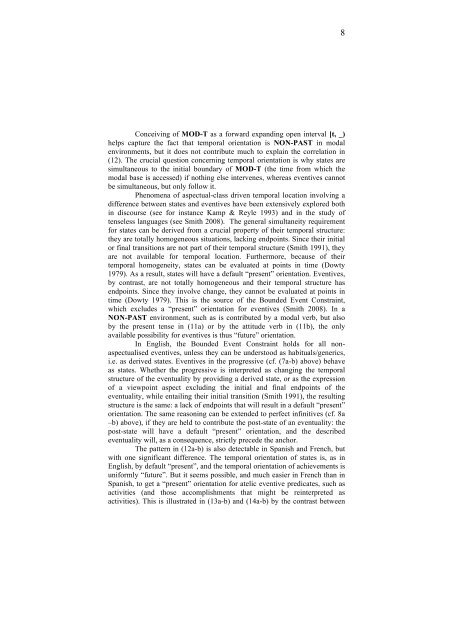On modal tenses and tensed modals - UMR 7023 - CNRS
On modal tenses and tensed modals - UMR 7023 - CNRS
On modal tenses and tensed modals - UMR 7023 - CNRS
You also want an ePaper? Increase the reach of your titles
YUMPU automatically turns print PDFs into web optimized ePapers that Google loves.
Conceiving of MOD-T as a forward exp<strong>and</strong>ing open interval [t, _)<br />
helps capture the fact that temporal orientation is NON-PAST in <strong>modal</strong><br />
environments, but it does not contribute much to explain the correlation in<br />
(12). The crucial question concerning temporal orientation is why states are<br />
simultaneous to the initial boundary of MOD-T (the time from which the<br />
<strong>modal</strong> base is accessed) if nothing else intervenes, whereas eventives cannot<br />
be simultaneous, but only follow it.<br />
Phenomena of aspectual-class driven temporal location involving a<br />
difference between states <strong>and</strong> eventives have been extensively explored both<br />
in discourse (see for instance Kamp & Reyle 1993) <strong>and</strong> in the study of<br />
tenseless languages (see Smith 2008). The general simultaneity requirement<br />
for states can be derived from a crucial property of their temporal structure:<br />
they are totally homogeneous situations, lacking endpoints. Since their initial<br />
or final transitions are not part of their temporal structure (Smith 1991), they<br />
are not available for temporal location. Furthermore, because of their<br />
temporal homogeneity, states can be evaluated at points in time (Dowty<br />
1979). As a result, states will have a default “present” orientation. Eventives,<br />
by contrast, are not totally homogeneous <strong>and</strong> their temporal structure has<br />
endpoints. Since they involve change, they cannot be evaluated at points in<br />
time (Dowty 1979). This is the source of the Bounded Event Constraint,<br />
which excludes a “present” orientation for eventives (Smith 2008). In a<br />
NON-PAST environment, such as is contributed by a <strong>modal</strong> verb, but also<br />
by the present tense in (11a) or by the attitude verb in (11b), the only<br />
available possibility for eventives is thus “future” orientation.<br />
In English, the Bounded Event Constraint holds for all nonaspectualised<br />
eventives, unless they can be understood as habituals/generics,<br />
i.e. as derived states. Eventives in the progressive (cf. (7a-b) above) behave<br />
as states. Whether the progressive is interpreted as changing the temporal<br />
structure of the eventuality by providing a derived state, or as the expression<br />
of a viewpoint aspect excluding the initial <strong>and</strong> final endpoints of the<br />
eventuality, while entailing their initial transition (Smith 1991), the resulting<br />
structure is the same: a lack of endpoints that will result in a default “present”<br />
orientation. The same reasoning can be extended to perfect infinitives (cf. 8a<br />
–b) above), if they are held to contribute the post-state of an eventuality: the<br />
post-state will have a default “present” orientation, <strong>and</strong> the described<br />
eventuality will, as a consequence, strictly precede the anchor.<br />
The pattern in (12a-b) is also detectable in Spanish <strong>and</strong> French, but<br />
with one significant difference. The temporal orientation of states is, as in<br />
English, by default “present”, <strong>and</strong> the temporal orientation of achievements is<br />
uniformly “future”. But it seems possible, <strong>and</strong> much easier in French than in<br />
Spanish, to get a “present” orientation for atelic eventive predicates, such as<br />
activities (<strong>and</strong> those accomplishments that might be reinterpreted as<br />
activities). This is illustrated in (13a-b) <strong>and</strong> (14a-b) by the contrast between<br />
8

















